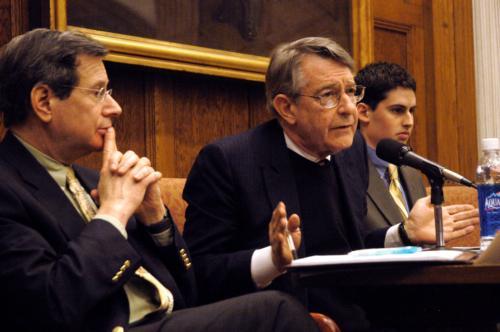
A panel of experts on divestment in Darfur addressed students at the Barker Center last night. Panelists included, from left to right, State Rep. Jay Kaufman and J. Daniel O’Flaherty.
Three key players in formulating Darfur divestment policy debated last night at the Barker Center, adding national scope to calls for the University to pull its investments of more than $13 million from companies that deal with the Sudanese government.
Hosted by the University Committee on Human Rights Studies, the panel’s lone opponent to divestment faced tough grilling from both spectators and fellow panel members for his opinions.
“States can’t make foreign policy,” said J. Daniel O’Flaherty, vice president of the National Foreign Trade Council.O’Flaherty also criticized a bill pending in the Massachusetts legislature that would divest state pension funds from select companies doing business with Sudan.
“Our point is to defend the prerogative of executive and federal government to wage a unitary foreign policy,” O’Flaherty said.
Last month, a federal judge declared unconstitutional a similar law, from Illinois, that would have barred state-backed investments in overseas companies dealing with Sudan.
But other panelists at the debate said the proposed Massachusetts bill would not lead to a contradictory foreign policy.
“The new bill would not contain the slightest conflict between the federal and state governments,” said State Rep. Jay Kaufman (D-Lexington), who helped draft the legislation. “We’d be simply adopting the federal government’s labeling of Darfur as a ‘genocide’ and acting consistently with their position. When the federal government removes the label of ‘genocide,’ investments can resume.”
According to a Boston Globe report last July, the state’s worker pension fund holds investments of more than $300 million in 23 non-U.S. companies doing business in Sudan. That includes $33.3 million in PetroChina, the oil firm from which Harvard announced its direct divestment two years ago.
But as of Dec. 31, Harvard still maintained a total of $13.4 million in indirect holdings in the oil companies Petronas and Sinopec, as well as PetroChina, through investment in funds managed by the British bank Barclays, according to a Crimson report last month.
Daniel Millenson from the Sudan Divestment Task Force extolled his organization’s plan of “targeted divestment,” which would only withdraw support from the few companies, including PetroChina and Sinopec, that contribute substantially to the Sudanese government.
Jacqueline Bhabha, the executive director of the University Committee on Human Rights Studies and the moderator of the debate, called the event “a rare opportunity.”
“Usually at these events, we’re just preaching to each other, but it’s a happy situation when there are diverging opinions,” she said in her opening remarks. “It forces us to sharpen our own.”
The violence in Darfur has killed an estimated 400,000 people, and forced 2.5 million to flee.
Read more in News
Faust was 'the candidate to beat,' Rudenstine says












